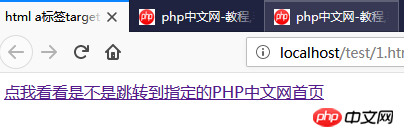 Web Front-end
Web Front-end
 HTML Tutorial
HTML Tutorial
 Detailed explanation of the usage and function of target blank attribute in HTML a tag
Detailed explanation of the usage and function of target blank attribute in HTML a tag
Detailed explanation of the usage and function of target blank attribute in HTML a tag
When making HTML pages, we often use the a tag attribute. As we all know, the a tag is used to define hyperlinks. If we are designing an HTML page and need to achieve the functional effect of clicking on a certain text or element to open one page and jump to another page, we will use the a herf tag attribute here. The herf tag is what you specify to jump to. A certain link address.
a tagThe syntax is as follows
<a href="你所要跳转的地址"></a>
So I don’t know if you have noticed that sometimes the target=_blank attribute is found in the a tag. Some novices may not be clear about this attribute. So this article will give you a detailed explanation of the specific usage and function of the target blank attribute of the HTML a tag.
The following is a simple HTML code example with the target blank attribute as follows:
<!DOCTYPE html>
<html>
<head>
<meta charset="utf-8">
<title>html a标签target blank属性使用示例</title>
</head>
<body>
<a href="http://www.php.cn" target="_blank">点我看看是不是跳转到指定的PHP中文网首页</a>
</body>
</html>You can copy and paste this code directly for local testing, the effect is as follows :


You can find that this text has been added with a hyperlink. After clicking, it successfully jumps to a new page, and everyone can find He opened a new window, and the previous page had no effect at all! So the attribute target=_blank means to open the hyperlink in a new window! Through this attribute, we can more conveniently view various jump pages. Don't worry about previous pages being overwritten.
If we do not set the target blank attribute, we will find that a new link is opened in the current window and the previous page will disappear.
We also need to pay special attention here:
The target blank attribute in the a tag must be together with herf to be effective!
So the above is the specific content of this article on the use and function of the target blank attribute in HTML. Hope it helps those in need!
The above is the detailed content of Detailed explanation of the usage and function of target blank attribute in HTML a tag. For more information, please follow other related articles on the PHP Chinese website!

Hot AI Tools

Undresser.AI Undress
AI-powered app for creating realistic nude photos

AI Clothes Remover
Online AI tool for removing clothes from photos.

Undress AI Tool
Undress images for free

Clothoff.io
AI clothes remover

AI Hentai Generator
Generate AI Hentai for free.

Hot Article

Hot Tools

Notepad++7.3.1
Easy-to-use and free code editor

SublimeText3 Chinese version
Chinese version, very easy to use

Zend Studio 13.0.1
Powerful PHP integrated development environment

Dreamweaver CS6
Visual web development tools

SublimeText3 Mac version
God-level code editing software (SublimeText3)

Hot Topics
 1371
1371
 52
52
 What is the purpose of the <progress> element?
Mar 21, 2025 pm 12:34 PM
What is the purpose of the <progress> element?
Mar 21, 2025 pm 12:34 PM
The article discusses the HTML <progress> element, its purpose, styling, and differences from the <meter> element. The main focus is on using <progress> for task completion and <meter> for stati
 What is the purpose of the <datalist> element?
Mar 21, 2025 pm 12:33 PM
What is the purpose of the <datalist> element?
Mar 21, 2025 pm 12:33 PM
The article discusses the HTML <datalist> element, which enhances forms by providing autocomplete suggestions, improving user experience and reducing errors.Character count: 159
 What is the purpose of the <meter> element?
Mar 21, 2025 pm 12:35 PM
What is the purpose of the <meter> element?
Mar 21, 2025 pm 12:35 PM
The article discusses the HTML <meter> element, used for displaying scalar or fractional values within a range, and its common applications in web development. It differentiates <meter> from <progress> and ex
 What is the viewport meta tag? Why is it important for responsive design?
Mar 20, 2025 pm 05:56 PM
What is the viewport meta tag? Why is it important for responsive design?
Mar 20, 2025 pm 05:56 PM
The article discusses the viewport meta tag, essential for responsive web design on mobile devices. It explains how proper use ensures optimal content scaling and user interaction, while misuse can lead to design and accessibility issues.
 How do I use the HTML5 <time> element to represent dates and times semantically?
Mar 12, 2025 pm 04:05 PM
How do I use the HTML5 <time> element to represent dates and times semantically?
Mar 12, 2025 pm 04:05 PM
This article explains the HTML5 <time> element for semantic date/time representation. It emphasizes the importance of the datetime attribute for machine readability (ISO 8601 format) alongside human-readable text, boosting accessibilit
 What are the best practices for cross-browser compatibility in HTML5?
Mar 17, 2025 pm 12:20 PM
What are the best practices for cross-browser compatibility in HTML5?
Mar 17, 2025 pm 12:20 PM
Article discusses best practices for ensuring HTML5 cross-browser compatibility, focusing on feature detection, progressive enhancement, and testing methods.
 How do I use HTML5 form validation attributes to validate user input?
Mar 17, 2025 pm 12:27 PM
How do I use HTML5 form validation attributes to validate user input?
Mar 17, 2025 pm 12:27 PM
The article discusses using HTML5 form validation attributes like required, pattern, min, max, and length limits to validate user input directly in the browser.
 What is the purpose of the <iframe> tag? What are the security considerations when using it?
Mar 20, 2025 pm 06:05 PM
What is the purpose of the <iframe> tag? What are the security considerations when using it?
Mar 20, 2025 pm 06:05 PM
The article discusses the <iframe> tag's purpose in embedding external content into webpages, its common uses, security risks, and alternatives like object tags and APIs.



